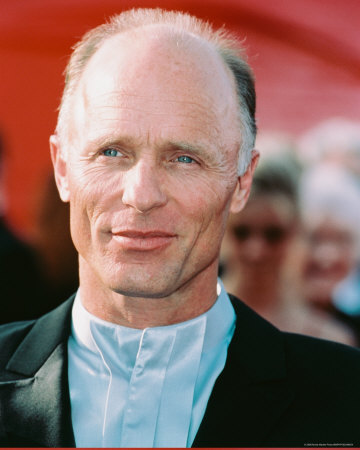Ed Harris' popularity in such movie blockbusters as last summer's "The Rock" and 1995's "Apollo 13" (Oscar nomination as Best Supporting Actor) has kept him busy in front of and, as producer, behind the camera. But he yearned to return to the stage, where he had triumphs on and off Broadway. However, on his first read of Taking Sides by Ronald Harwood (1982 Tony-nomination for The Dresser), Harris felt his character, American army Major Steve Arnold, was too cut and dried. Arnold is assigned to the American sector of 1946 occupied Berlin to investigate symphony conductor Wilhelm Furtwangler (memorably played by Daniel Massey, who originated the role in England) for Nazi collaboration during the war and his participation in the drive to ban "Jewish, Bolshevik music." Furtwangler was cleared of charges by fellow Germans, but the Americans were determined to build a case against him.
There's little known about why we went after him with such vengeance," said Harris. "Supposedly, the Russians wanted him because of his fame and our guys said, 'No way.'" Since no investigation transcripts exist, the confrontation between the conductor and the American major, is supposition. Harris liked the play but "...found Arnold too black and white -- the stereotypical ugly American versus a cultured European."
Using the six-month contract (plus an additional month of rehearsal) as an excuse, Harris declined producer Alexander Cohen's offer. "But Alex kept saying, 'You're a fool if you don't do this.' I replied I'd love to, but I couldn't do that to my family." (He and actress wife Amy Madigan have a four-year-old daughter.) Cohen finally compromised on three months. "So I read the script again," laughed Harris. "I found a lot of complexity to this guy, which thanks to [director] David [Jones], I was allowed to discover during rehearsals. You're never quite sure where he's coming from, which might be a ploy; and he's a lot smarter than he lets on."
Unlike some military types he's played, say in "The Rock," Harris explained, "This guy doesn't care about protocol. Before the war he was an insurance claims assessor, and now he's interrogating prisoners of war, with carte blanche as to how he goes about it." Though Harris found similarities to characters he's played, "I wanted to make Arnold different, so I picked up on the humor in Ron's script, finding more than I expected, and ended up with a composite of someone original."
Harris "was consumed by football and baseball since age five, but in college it ceased being fun. Everybody was bigger and faster. I had good instincts as a running back, but I wasn't great." Seeing theater, he thought acting looked like something he could do. "A whole new world opened. The closest thing to scoring a touchdown was doing a play and having audiences applaud. I liked the cheers. Still do!"
"The Right Stuff" (1986) catapulted Harris [as astronaut John Glenn] to movie stardom and brought him to Broadway in Precious Sons (1986). He was nominated for a Best Actor Tony Award. Off Broadway in Sam Shepard's Simpatico (1994), he won the Lortel Award as Best Actor. "There's nothing more invigorating than live theater," Harris said, "rehearsing, having a different audience each performance, and coming up with the goods as I explore and grow into the character. In film you don't have that opportunity. The rehearsal is the shoot. You know who your character is when you finish the film."
[END]

